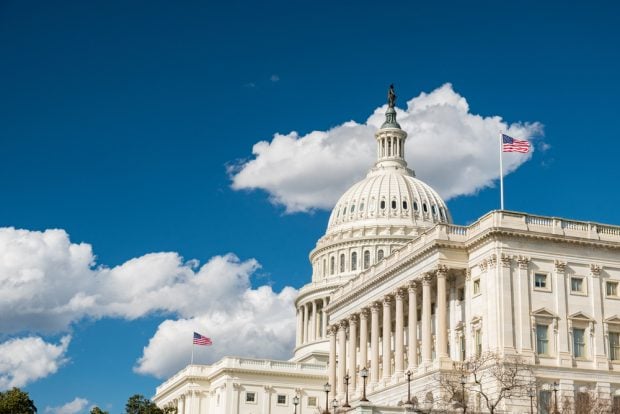 Source: Shutterstock.
Source: Shutterstock.
Time is running short and as Congress returns during the next two weeks, it has a daunting list of must-do and wants-to-do legislation before members go home for the run-up to Election Day.
The Senate returns this week, while the House is concentrating on remote hearings before returning next week. The Senate is scheduled to be in session 17 days between now and Nov. 3, while the House likely will be in session for 15 days once it returns.
Recommended For You
Even in the best of worlds, that is not much time to do serious legislating. Of course, this is not the best of worlds, with the nation bitterly divided just weeks before the election, so it remains unclear how much can be accomplished.
Still, an examination of the wish lists prepared by members of Congress, NCUA Chairman Rodney Hood, as well as CUNA and NAFCU makes it clear that the credit union industry has a lot still on its list.
Kyle Hauptman
Senate Republicans would like to see Hauptman confirmed for a seat on the NCUA sooner rather than later.
The Senate Banking Committee has recommended that Hauptman be confirmed, but Senate GOP leaders have given no indication of when the nomination will go to the full Senate. If Hauptman is confirmed, it likely would mean that Republicans will hold the majority on the board even if former Vice President Joe Biden is elected president.
If Hauptman, by some chance, is not confirmed by the end of the year and Biden is elected, Democrats could control the majority.
Government Funding
Funding for much of the federal government expires on Sept. 30, the end of the fiscal year. The NCUA and CFPB are funded outside the appropriations process, so they will continue to operate even if funding lapses.
Still, credit union advocates are watching a couple of issues closely. The annual Financial Services appropriations measure includes the Community Development Financial Institutions and the NCUA's Community Development Revolving Loan programs.
The House version of the FY21 spending measure calls for $273.5 million for CDFI — an $11.5 million increase — and $2 million for the revolving loan fund program. However, the Senate has not begun its appropriations process yet.
The House bill also includes a provision that would set aside $2 million to test postal banking —an idea that credit union trade groups have vehemently opposed.
Credit union trade groups have been lobbying senators to keep postal banking out of their funding measure.
Defense Authorization
House and Senate conferees will be working toward a compromise on the massive annual defense authorization bill. The Senate version of the bill would provide the same free rent benefit on military bases that credit unions now receive.
The House bill does not include that provision; banking trade groups have been pushing for conferees to include that provision in any conference agreement, while credit union associations have been lobbying conferees to include the House provision.
Paycheck Protection Program
The PPP still has almost $134 billion it could lend to small businesses, but the authorization for the program expired on Aug. 8. If Congress passes another economic stimulus bill, the authorization and funding for the program could be added to the mix.
Credit union trade groups and other financial services associations also have been pushing for automatic loan forgiveness for all loans under $150,000. However, consumer groups and some Democrats have said the program was vulnerable to fraud and automatic loan forgiveness would remove one piece of the oversight process.
Community Development Financial Institutions
Aside from funding to help CDFIs operate, many Democrats and credit union trade groups are pushing for additional funds for CDFIs to lend. Recent studies have shown that businesses in underserved areas have not received the same level of assistance as businesses in other neighborhoods received.
The SBA reported that CDFIs made more than $3.4 billion in loans during the second round of CDFI lending.
Senate Democrats have introduced legislation that would create a $2 billion CDFI crisis fund to provide additional funding to CDFIs.
Liability Protection
Liability protection has emerged as one of the most contentious issues in negotiations over another stimulus bill. As preliminary talks began, Senate Majority Leader Mitch McConnell (R-Ky.) said that the next stimulus bill must contain protections from liability for business that make good faith efforts to make their facilities coronavirus-proof.
Credit union trade groups and other business associations have thrown their support behind the idea. However, Democrats have been steadfast in their opposition to the idea, with consumer groups siding with the Democrats.
Other Credit Union Proposals
In April, NCUA Chairman Rodney Hood, at the request of Senate Banking Chairman Mike Crapo (R-Id.) submitted a list of proposals that he said would allow credit unions to expand their assistance to members. And credit union trade groups have endorsed many of those proposals.
However, they have not been considered by Congress up until now. They include:
- Making permanent the changes to the NCUA's Central Liquidity Facility. Credit union trade groups have said that strong liquidity is a key to ensuring that credit unions are able to respond to the needs of small businesses and families.
- Decreasing the level at which credit unions are considered well capitalized from a net-worth ratio of 7% to 6% and adequately capitalized from 6% to 5%.
- Temporarily expanding the credit union Small Business Loan cap.
- Permanently expanding credit union reach for underserved areas by authorizing all credit union-chartered institutions to apply to serve areas designated as underserved.
© Touchpoint Markets, All Rights Reserved. Request academic re-use from www.copyright.com. All other uses, submit a request to [email protected]. For more inforrmation visit Asset & Logo Licensing.






